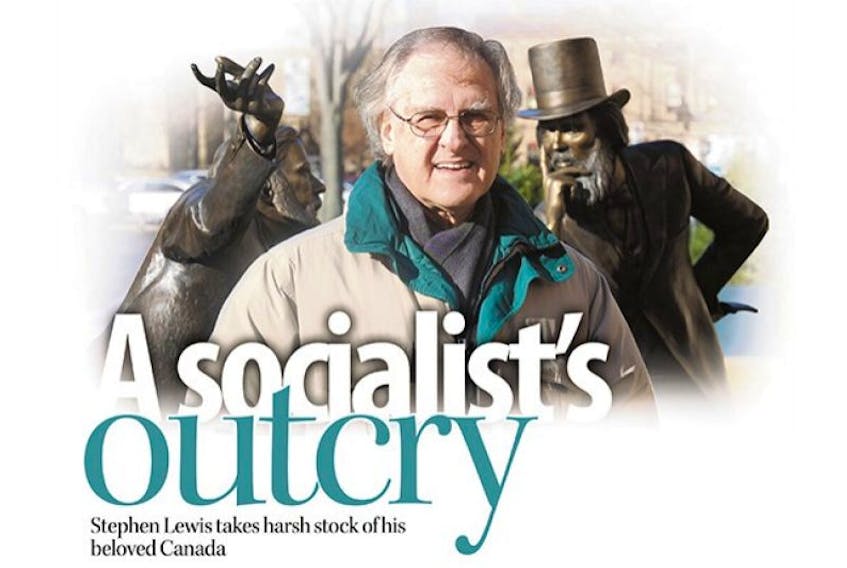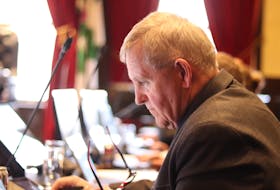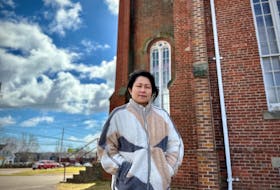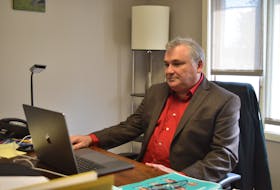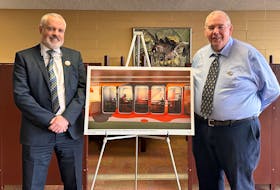Stephen Lewis, who turned 77 earlier this month, has not softened with age.
Not one bit.
So does Canada’s most recognizable human rights activist remain edgy, feisty and outspoken because he feels it is expected of him?
“No, I don’t worry about expectation at all,’’ Lewis said during an interview with The Guardian Friday before letting loose a short time later in a no-holds barred attack on Stephen Harper’s reign to the roar of an approving audience at the Confederation Centre of the Arts.
“I’ve become impatient — less diplomatic, less inclined to assuage fragile egos, less inclined to pull my punches...I have an emotional range which moves from rage to rage...so almost anything gets to me. You name it and I’m ready to be rhetorical.’’
Lewis clearly relishes the role of advocate. He has gleefully stepped up on one soapbox after another for many years while his equally outspoken wife Michele Landsberg, a celebrated journalist and feminist, has also made her voice well heard.
He loves the opportunity to say things that others won’t say — and somehow get away with it.
“I will admit that being an advocate is the strongest sense of self,’’ he says.
“I really think that it is important to say things that I hope are true and real. All the people I work with are of similar disposition: unequivocal and uncompromising in their views.’’
Lewis had plenty to rave on about during a lively, impassioned speech in delivering the 2014 Symons Medal Lecture to a packed Homburg Theatre house over the lunch hour (and a bit) Friday.
He began with a spirited dissection of what he views to be a damaging decline of Parliament. He holds the current negative political discourse in great disdain.
“I’m not suggesting that political bonhomie is necessary to get things done; you can have deep ideological rifts across the floor of the House of Commons, and still manage to effect good, positive social change,’’ he said.
“But a vital requirement is respect; vitriolic nastiness in debate does not breed respect, nor does adolescent partisanship, nor do pieces of legislation of encyclopedic length that hide contentious issues, nor does the sudden emergence of frenzied TV attack ads, nor does the spectre of a Prime Minister’s Office exercising authoritarian control.’’
Lewis, who served as the leader of the Ontario New Democratic Party from 1970 to 1978, says a legislature that functions with respect accomplishes a great deal all in the name of parliamentary democracy.
Perhaps his greatest outrage was leveled at the practice of the long-running federal Conservative Party doing all in its power to snub, silent and squash any number of social causes that go against its grain. Any group or organization that disagrees with the government, observes Lewis, pays a price.
“Sometimes it’s mindless excoriation, and sometimes it’s a brazen use of the power of the state to shut people up, as has happened with so many of the federal government’s scientists who now can’t give an interview without a junior communications specialist from the PMO standing by his or her side,’’ he says.
“The cuts in funding to women’s groups is spectacularly egregious,’’ he added to loud applause.
“It’s truly unsettling that at a moment when Canadians — and incidentally, much of the world — are preoccupied with the entire panoply of women’s rights, necessarily focused on sexual violence, our government sees activist women’s organizations as expendable, or worse, as foes to be crushed.’’
Lewis went on to extend his angered attack against Harper’s regime to a scathing assessment of government’s action — and inaction — towards First Nations.
He finds particularly deplorable Harper’s refusal to establish a commission of inquiry into the 1,181 murdered and missing aboriginal women in the country.
“It is as though Canada had decided, like some mindless national curmudgeon, to be a permanent outlier on issues of minority rights and women’s rights,’’ he says.
“It does us damage. It does us shame.’’
Lewis argues that not only is the government causing great hurt to many of its people by turning a blind eye to pressing social concerns, the federal Tories are also doing punishing damage to the environment.
“The inescapable need to shift, urgently and dramatically, away from coal, oil and natural gas to renewable sources of energy seems to be recognized by virtually every country on the planet, save Canada,’’ he says.
“We are religiously devoted to the Tar Sands regardless the consequences.’’
Stephen Lewis, who turned 77 earlier this month, has not softened with age.
Not one bit.
So does Canada’s most recognizable human rights activist remain edgy, feisty and outspoken because he feels it is expected of him?
“No, I don’t worry about expectation at all,’’ Lewis said during an interview with The Guardian Friday before letting loose a short time later in a no-holds barred attack on Stephen Harper’s reign to the roar of an approving audience at the Confederation Centre of the Arts.
“I’ve become impatient — less diplomatic, less inclined to assuage fragile egos, less inclined to pull my punches...I have an emotional range which moves from rage to rage...so almost anything gets to me. You name it and I’m ready to be rhetorical.’’
Lewis clearly relishes the role of advocate. He has gleefully stepped up on one soapbox after another for many years while his equally outspoken wife Michele Landsberg, a celebrated journalist and feminist, has also made her voice well heard.
He loves the opportunity to say things that others won’t say — and somehow get away with it.
“I will admit that being an advocate is the strongest sense of self,’’ he says.
“I really think that it is important to say things that I hope are true and real. All the people I work with are of similar disposition: unequivocal and uncompromising in their views.’’
Lewis had plenty to rave on about during a lively, impassioned speech in delivering the 2014 Symons Medal Lecture to a packed Homburg Theatre house over the lunch hour (and a bit) Friday.
He began with a spirited dissection of what he views to be a damaging decline of Parliament. He holds the current negative political discourse in great disdain.
“I’m not suggesting that political bonhomie is necessary to get things done; you can have deep ideological rifts across the floor of the House of Commons, and still manage to effect good, positive social change,’’ he said.
“But a vital requirement is respect; vitriolic nastiness in debate does not breed respect, nor does adolescent partisanship, nor do pieces of legislation of encyclopedic length that hide contentious issues, nor does the sudden emergence of frenzied TV attack ads, nor does the spectre of a Prime Minister’s Office exercising authoritarian control.’’
Lewis, who served as the leader of the Ontario New Democratic Party from 1970 to 1978, says a legislature that functions with respect accomplishes a great deal all in the name of parliamentary democracy.
Perhaps his greatest outrage was leveled at the practice of the long-running federal Conservative Party doing all in its power to snub, silent and squash any number of social causes that go against its grain. Any group or organization that disagrees with the government, observes Lewis, pays a price.
“Sometimes it’s mindless excoriation, and sometimes it’s a brazen use of the power of the state to shut people up, as has happened with so many of the federal government’s scientists who now can’t give an interview without a junior communications specialist from the PMO standing by his or her side,’’ he says.
“The cuts in funding to women’s groups is spectacularly egregious,’’ he added to loud applause.
“It’s truly unsettling that at a moment when Canadians — and incidentally, much of the world — are preoccupied with the entire panoply of women’s rights, necessarily focused on sexual violence, our government sees activist women’s organizations as expendable, or worse, as foes to be crushed.’’
Lewis went on to extend his angered attack against Harper’s regime to a scathing assessment of government’s action — and inaction — towards First Nations.
He finds particularly deplorable Harper’s refusal to establish a commission of inquiry into the 1,181 murdered and missing aboriginal women in the country.
“It is as though Canada had decided, like some mindless national curmudgeon, to be a permanent outlier on issues of minority rights and women’s rights,’’ he says.
“It does us damage. It does us shame.’’
Lewis argues that not only is the government causing great hurt to many of its people by turning a blind eye to pressing social concerns, the federal Tories are also doing punishing damage to the environment.
“The inescapable need to shift, urgently and dramatically, away from coal, oil and natural gas to renewable sources of energy seems to be recognized by virtually every country on the planet, save Canada,’’ he says.
“We are religiously devoted to the Tar Sands regardless the consequences.’’
Strong foundation
The Stephen Lewis Foundation works with community-based organizations working to turn the tide of HIV/AIDS in Africa.
Since 2003, the foundation has funded more than 1,100 initiatives, partnering with over 300 community-based organizations in 15 countries.
The foundation works with a variety of grassroots initiatives, with a particular focus on children affected by AIDS, grandmothers, home-based health care, positive living, and sexual violence and HIV/AIDS.
To learn more about the foundation, visit www.stephenlewisfoundation.org.
Special honour
Stephen Lewis is the 12th person to receive the distinguished Symons Medal and deliver the Symons Lecture at the Confederation Centre of the Arts.
The Symons Medal Lecture is a national platform for an eminent Canadian to discuss the current state and future prospects of Confederation.
Lewis joins the likes of Prince Charles, former Canadian prime minister Paul Martin and Chief Justice of Canada Beverley McLachlin in receiving the Symons Medal.

